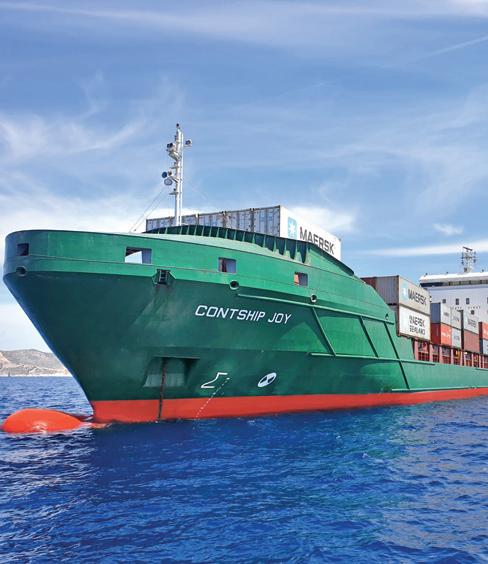




N. D. Pateras’ latest venture, Contships, the largest independent container feeder ship provider globally, has successfully navigated the commercial waters thanks to resilience and vision. While the Greek concern focuses on expanding its fleet and improving the value chain, it is also vocal on the pressing topics affecting the industry. George Pateras, Deputy Chairman of Contships Management, spoke with Andy Probert.
Contships Management is an invaluable component in the start of the global supply logistics chain and a lifeline in the final delivery of cargo to remote communities. Its feeder fleet, with capacities between 900 and 1,500 TEU, works like a well-oiled machine, providing uninterrupted and reliable services.
At the heart of its operations is a dedicated team with a long track record in shipping, ensuring continued success in this niche. Contships is led by Nikolas and his cousin George Pateras, the fifth and sixth generations of a Greek family
whose ties to shipping date back to the 1800s, demonstrating its strong roots and resilience.
“As the world’s largest independent supplier of feeders, we are immensely proud to be playing an active and prominent role in the Greek and worldwide shipping industry,” Deputy Chairman George Pateras said.
Supply backbone
The Pateras family’s shipping history began by investing in sailing vessels in 1870 before buying its first steel sail-assisted vessel in 1902. The family expanded into triple-expansion steamships and owned general cargo ships and bulk carriers before later generations moved into the feeder vessel segment.

Contships, established in 2015, has acquired 58 container ships and currently runs 47 vessels that cover the first- and last-mile of the supply chain within the hub-and-spoke system. Its fleet now calls at 4,800 ports and carries a 1.7m TEU annually, while employing 1,000 seafarers and 125 shore staff.
“Our vessels take cargo from ‘spoke’ ports to larger ‘hub’ ports,” Mr Pateras explained. “Motherships take the cargo from hub to another hub, and from there, our feeders take them to remote ‘spoke’ ports. Feeder containerships are a vital link as they are the backbone of the supply logistics chain.”
Contships has an established record with the world’s leading container feeder charterers, such as MSC, Maersk Line,



CONTSHIPS MANAGEMENT I

CMA-CGM, Cosco and ONE. Contships’ feeders presently operate in the Caribbean, the Far East, Australasia, West and East Africa, Northern Europe, and the Mediterranean.
“Our reputation is that we don’t like challenging our business partners,” said Mr Pateras. “If an issue arises, we find a solution. We provide a reliable service and enjoy repeat business.
“Our company is loyal to Greek suppliers because we want to support our economy in any way we can. But we expect consistent quality and need our suppliers to be available 24/7, because shipping never sleeps.”
Serious on sustainability
Looking ahead, Mr Pateras summarised Contships’ goals: “For us, expansion of our fleet is always on the table as we don’t like sitting idle. But sustainability is at the
top of our agenda: how we can burn less fuel and reduce carbon emissions. Our mentality is to be more efficient with the vessels we currently trade.
“Sustainability also involves a cultural transition. We are training crews to be proactive and encouraging them to come forward with their innovations. We are heavily invested in ensuring that sustainability becomes second nature on board.”
Contships is considering potential avenues of new builds and conversions.
“Our fleet has an average age of around 14 years, but over 50% of the global fleet in our sector is over 20 years old,” Mr Pateras continued. “So, sustainability must eliminate the older vessels that are uneconomical to transform and make way for younger ones. At least 180 feeders (1000 -1500 TEU) are over 20 years old and must be scrapped immediately.
“We need science to prevail on sustainability, not a politically correct, votewinning decision. We must consider the well-to-wake element in shipping terms, similar to the cradle-to-grave lifecycle.

“However, we are not into these whimsical ideas on alternative fuels that are either unreliable, unsafe or untested. We must be honest with our charterers and safe for our crews. We can’t afford to get it wrong on fuel because we are getting too near the critical stage of climate change.”
Despite the talk around methane, hydrogen and ammonia, Mr Pateras favoured nuclear energy and carbon capture as long-term solutions.
Facing challenges
Contships is also adapting to many issues: sustainability, geo-political issues, sanctions and market disruptions. One topic close to Contships’ heart is the long-
term investment in quality officers and shipping personnel.
As President of the Hellenic Chamber of Shipping, Mr Pateras is leading a campaign to recruit more young people into the industry. The Chamber, which represents thousands of stakeholders in shipping, is the official advisor to the government on all shipping matters and works closely with the Ministry of Merchant Marine.
“We have to persuade the youth to com e back to the sea, because if we don’t have good and qualified seamen, then we will not have future personnel for our offices, ”


Mr Pateras explained. “We want to give school leavers a chance; otherwise, they will never get ahead.”
Contships is also concerned about EU regulations imposed on shipping, such as the tax on fuel and the uneven application of the IMO’s Carbon Intensity Indicator (CII), according to Mr Pateras: “The IMO’s carbon intensity rules put container feeder ships at a disadvantage as almost all the voyages are less than 3 days, together with long ports stays compared to the larger container ships that perform the long haul voyages with comparatively short port stays. The CII rating assesses work done whilst sailing and not whilst idle in port.”
The IMO regulation, which entered into force on 1 January 2023, lists ‘heavy-load carriers’ in a catalogue of special vessels to which the CII does not apply. Yet there are concerns that carrying containers on heavy-lift vessels might be environmentally counterproductive, as

they require higher-consumption engines for propulsion.
“92 per cent of our voyages are under three days,” said Mr Pateras. “It makes it very difficult to get a good CII rating, especially when sailing to a port where we may face external delays before discharge.
As you can appreciate, calling at 4,800 ports annually seriously affects our CII rating.
“Contships goes to remote islands and small inaccessible ports whose


economies rely on us. Our feeder services are the lifeblood of communities. We are doing a service, but potentially destroying our CII credit due to the short voyages. So, change is seriously needed.”
Centre stage
Such a hot issue is bound to dominate discussion at Posidonia 2024, the world’s most prestigious shipping exhibition. Contships and thousands of global exhibitors are expected to converge on Athens for the June 3-7 event.
The Hellenic Chamber of Shipping will contribute with a stand in the Shipping Square, a focal meeting point for stakeholders.
“Posidonia supports the shipping community and can bring it closer together in a friendly, non-business atmosphere,” Mr Pateras continued. “It is an excellent networking event to meet people, thank them for the work we have done together and get to see innovative ideas emerging in the industry.”
Enthused about Contships’ future, Mr Pateras said, in conclusion: “Contships has dedicated, high-quality staff and
a fleet which is maintained to a high standard. We are at a perfect point to take advantage of any market upturns, adapt to new regulations and respond to environmental concerns.” n


